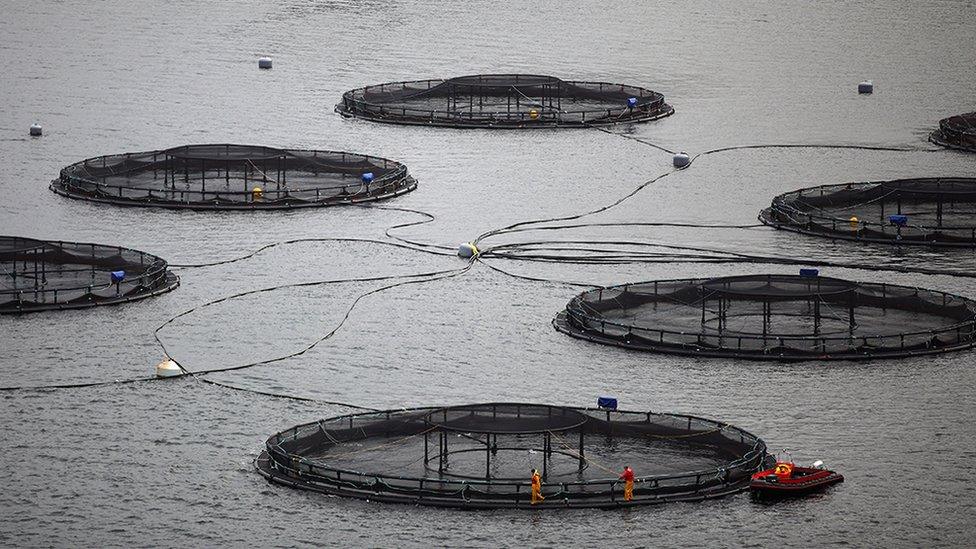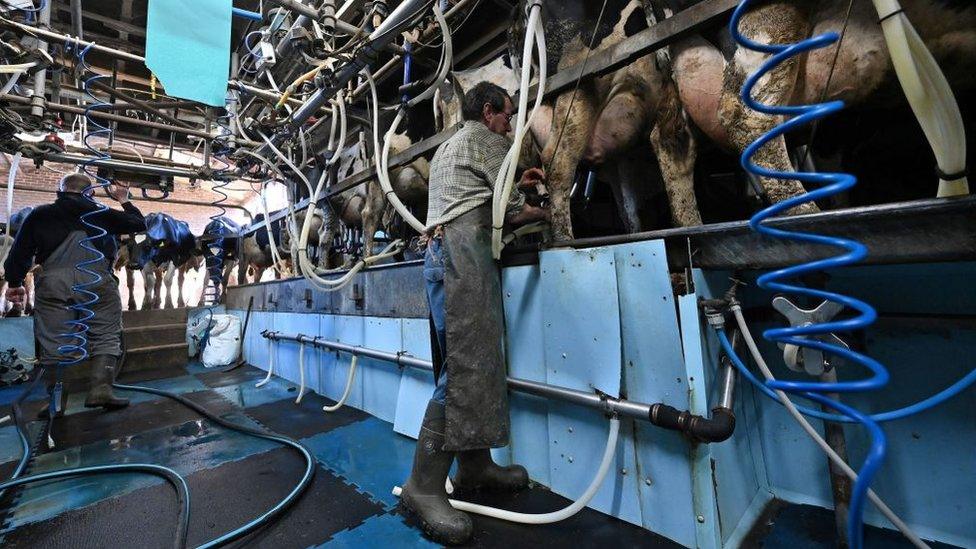Feeding Britain: Can we grow it alone?
- Published

The closure of cafes and restaurants has contributed to reduced demand for dairy products
Does Britain need to be less dependent on imported food? Its food producers would like us to think so, though they would also like to improve exporting
They have battled through panic-buying and abrupt shifts in production and logistics, with the sudden loss of hospitality markets
Crisis is being seen as an opportunity to reset consumer choices and expectations for a permanent change to the "eating eco-system"
Self-sufficiency. Don't count on others. Look after ourselves. It's one response to crisis, which became more of a business concern after supplies from Asia were disrupted in the early phases of coronavirus crisis.
Then airfreight was cut by aircraft being grounded, and the movement of people between countries all but stopped.
It's become the mantra of Trumpians in the US - re-shoring manufacturing from Asia, and going into a risky spiral of trade spats with China. India's response to crisis has been to turn in on itself and its own markets.
Going further back, it was also in Brexit rhetoric, telling us we didn't need to depend so much on imports from the continent, and should return to making things for ourselves.
Complex supply chains, on which countless jobs depend? Tough luck - simplify 'em.
That's the background to an initiative launched on Monday by the UK food and drink industry, to reverse the steady rise of dependence on imported food over recent decades.
It's one of those initiatives to shape the future of the economy as Britain pulls out of crisis. That's despite a lot more crisis for the food and drink sector to deal with, before arrival at that less import-dependent destination.
Pound of mince
So before we consider a future of more British food for British gobs, how are things going in food and drink? We all still need food (some of us, I admit, have depended on it for lockdown comfort rather more than we should), and the retail sector has worked with producers to keep things flowing.
The panic-buying and hoarding weeks of March seem a long time ago. The industry weathered that storm and moved on to the challenges of re-shaping retail and delivery to a very different landscape - with lower footfall, distancing and measures to protect staff - while demand was distorted by the running down of those hoarded food stocks.
For many, the absence of restaurants and catering has been a huge challenge. Scottish salmon farmers used to supply enough for a million meals a day, much of it in sandwiches and catered meals. Fish farmers are having to find new routes to new markets.
Tonnage has been left in farm cages, awaiting an upturn in demand, which means capital is tied up and revenue reduced.
A lot of fish - farmed and caught by the deep-sea fleet - is filling up processors' freezer capacity.
Those who land langoustines and lobsters have had to find new markets and teach new tricks to home chefs. Producers have innovated by selling and delivering direct to the domestic customer.
Prime cuts of beef that would normally be expertly grilled in a restaurant are being minced, because that's what the consumer will buy.
I'm told by David Thomson, chief executive of the Food and Drink Federation in Scotland, that the quality of the average pound of mince has never been higher.

A lot of farmed fish is sitting in freezers at processor plants
Farmers have had to adapt to far fewer migrant workers coming into Britain to work. They were quick to advertise jobs online for domestic recruits, aware that an employment crisis was breaking in other sectors.
There was a lot of interest at first, I'm told. Some of that fed through to job applications. But very few British-based recruits have stuck with the job. It's hard work.
To help the industry, one of the significant exemptions in the quarantine rule for inbound travellers is that farm workers can isolate as a group while working the berry fields.
Some producers are struggling to find new markets. Without cafes open to froth up cappuccinos, our collective appetite for milk has fallen. But cows still have to be milked, particularly at this time of year with the "spring flush". The industry is asking: will there have to be a significant cull of Britain's dairy herd, to match supply with demand?
Of course, producers desperately want restaurants, hotels and canteens to reopen. But that brings new risks. Whereas these outlets for food are now hibernating, with furlough payments to keep them alive, once they're exposed to a very uncertain market, without government support, Mr Thomson voices industry concerns that they may not last long, leaving their suppliers high and dry.
He also points out that eating out in restaurants will be curtailed not only by government regulation and by customer anxiety about infection, but by the rise in unemployment meaning an aggregate reduction in spending power.
Trade tariffs
Amid the uncertainty, one welcome aspect of government support that is rarely mentioned, but vital to business, is in trade credit insurance. That's the guarantee that you will be paid by the restaurant you're supplying with, say, butcher meat, even if the restaurant becomes insolvent.
It's clear that the risk of that insolvency, when lockdown eases, will be much higher than before. Commercial insurance could be withdrawn or premiums could soar, so the government has stepped in with its own £10bn reinsurance guarantee, intended to keep those contracts flowing.
But will it ensure that food and drink keeps flowing into the UK, to meet our demand and appetite for foreign fare?
Possibly not. The prospect of a no deal on Brexit by the end of this year could usher in a sharp reduction in trade.
To protect UK farmers, used to the protection of the Common Agricultural Policy of both subsidy and trade protection from non-Europeans, the UK would have to introduce high tariffs on imports. Without a special trade deal with the EU, that would have to apply to Europe as well.
Or some free trade ideologues favour removing tariffs, opening up to lower cost producers elsewhere, and letting the market adjust. That would probably devastate farming.
Amid the talk of opportunity, there is clearly also alarm: "The UK's 7,000 small and medium-sized food and drink manufacturing enterprises are particularly vulnerable in the middle of the 'eating ecosystem'. There is little clarity on new trading arrangements due in seven months.
"It is essential we build an agreed, coherent plan on these key economic, environment and health issues for the UK. Early removal of tariffs would be very difficult to reverse, so we would advocate a more detailed case by case examination before final decisions are taken."

How would British farmers fare if tariffs were removed?
That is the view of the wide range of 31 producer organisations, from the overarching Food and Drink Federation to the niche Vinegar Brewers Association, with their outline plan for reform to the "eating eco-system".
They cite the BBC in reporting that Britain's ability to feed itself has declined from 65% of the market in 1998 to 50% by 2017.
That may reflect changing UK tastes and growing appetites, or a higher degree of specialisation and more efficient production across continental Europe. It could reflect a lack of incentives from markets and subsidies for the British farmer and other producers.
The industry alliance would like us to adapt our eating choices to rely more on goods that can be produced in the UK.
It suggests that could be tied in with government targets for healthier eating, from reduced fat to portion control.
The various lobby groups offer up the prospect of animal welfare standards more attuned to British sensibilities and lower food miles travelled to help reach environmental targets.
The plan is not for complete self-sufficiency. Turnips might make winter feel a lot longer than it is already.
Instead, the target is to take the recent £24bn trade deficit in food and to cut it by £8bn. That would not only be achieved by substituting imported food with the home-grown variety, but by boosting exports.
At present, the big exports are Scottish - whisky and salmon. After that, they are chocolate, cheese, pork, gin, beef and breakfast cereals. Even English wine makes the top 10.
Salute the flag
The industry's strategy borrows heavily from the joined-up approach to the food and drink export effort in Scotland, Wales and the Republic of Ireland. It wants to see a similar approach to Scotland Food and Drink, with a new agency called UK Food and Drink, with £120m of annual UK government funding in its early years. They do so with a plea to retain divergent, devolved approaches across the UK.
This is but one answer to the looming battles within government, and outside it, about adopting food standards from trading partners other than the European Union, and notably the US: have neither.
But it's not that simple. There are powerful forces driving international trade in food. Other countries will want trade deals that open up more sales to the UK, not less.
And it's a big ask of the consumer and retailers to make a shift to buying British, unless price, weakening sterling and tariffs combine for a decisive push in that direction.
The industry senses, as others do, that the current Covid-19 crisis, followed by Brexit, together offer an opportunity to plough through change much faster than is usually possible.
They want to plant a flag in the grocery aisles, which may be the union flag, the Saltire or Welsh dragon, in the hope that shoppers will rally to it and show patriotic loyalty to home-grown producers.
